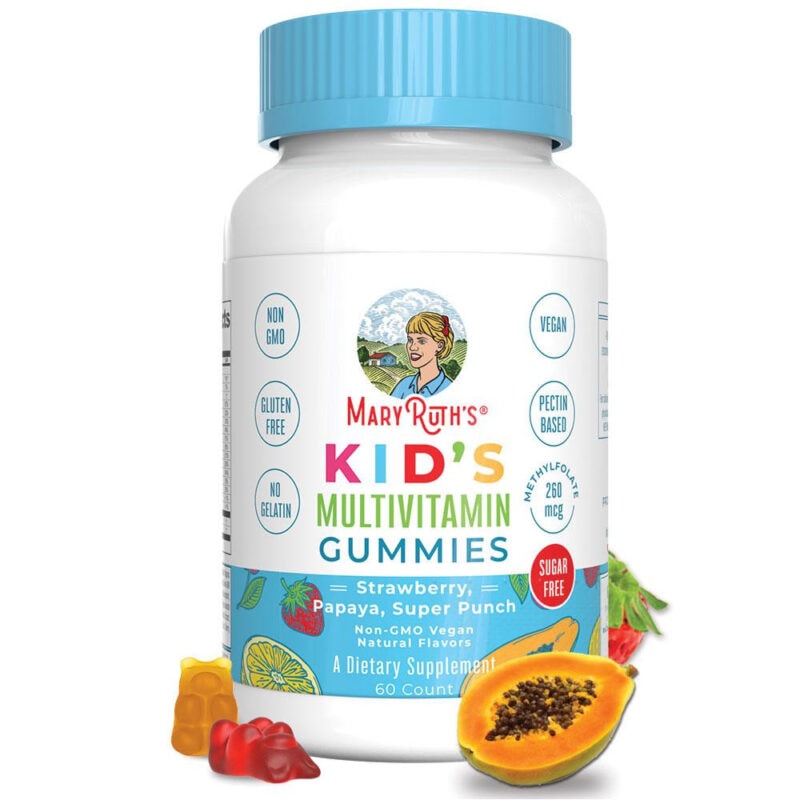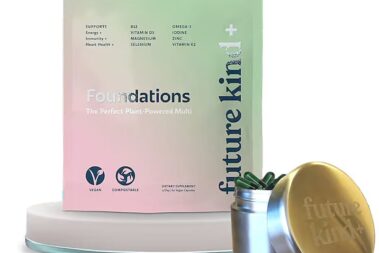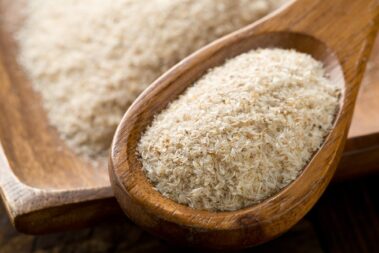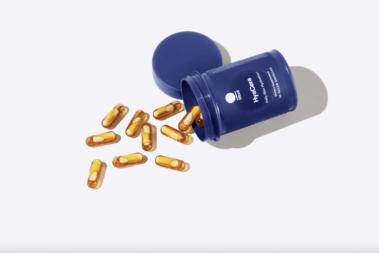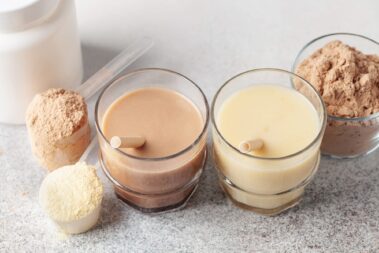Not every child needs a multivitamin. However, kids raised on a more strict diet may benefit from the “insurance” that a multivitamin can provide nutritionally. This is especially true for potential nutrients of concern on a vegan diet, like vitamins D and B12, iodine, and omega-3 fatty acids.
That’s why we’ve compiled a list of the 6 best options for vegan kids multivitamins, based on their nutritional makeup and quality of ingredients parents can feel good about.
Table of Contents
Our Picks at a Glance
- Best Overall: Garden of Life mykind Organics Kids Gummy Vitamins
- Best “One-A-Day”: Hiya Health Kids Daily Multivitamin
- Best Without Iron: Goli Complete Kids Multi Gummies
- Best Gummy: MaryRuth’s Vegan Kids Multivitamin Gummies
- Best for Infants: ChildLife Essentials Multi Vitamin and Mineral
- Best Melting Tab: Renzo’s Picky Eater Multi
The Best Vegan Kids Vitamins
1. Garden of Life mykind Organics Kids Gummy Vitamins
Garden of Life mykind Organics Kids Gummy Vitamins are designed to support the overall health of growing kids using whole food, plant-derived nutrients. They use pectin in place of gelatin and are deliciously fruit or cherry flavored and sweetened with fruit juice.
Serving directions are 4 gummies per day for children aged 4 and older. Because all of the nutrients come from whole foods, the serving size is a little higher than your typical kid’s vitamin.
These comprehensive multivitamins contain vitamin B12 in the form of methylcobalamin, a natural form of the vitamin that is easily absorbed. Additionally, they provide vitamins A, C, D, E, and B6, pantothenic acid, iodine, and zinc.
Because all of the nutrients in this multivitamin are derived from real, raw foods rather than made in a lab, they contain many of the cofactors necessary for the body to use them effectively. Each gummy is gluten-free, certified kosher, and vegan-certified.
2. Hiya Health Kids Multivitamin
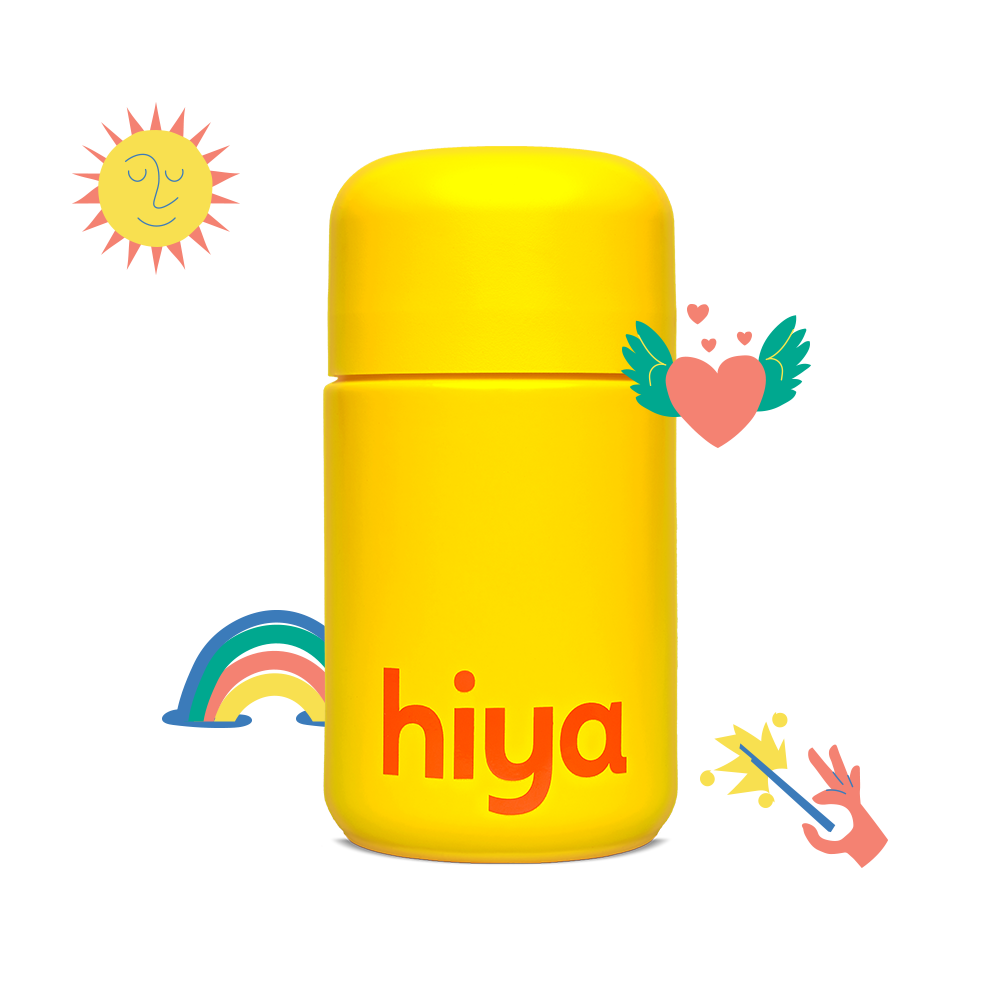
Hiya is a comprehensive chewable daily multivitamin for kids aged 2 years and older, made with 15 essential vitamins and minerals and a blend of 12 fruits and veggies. It contains vitamins B12, K2, and D, which are especially important for plant-based children.
Kids only need to take 1 multivitamin per day, which contains zero grams of sugar. Instead of sugar, Hiya uses a blend containing monk fruit extract for sweetening. They are vegan, gluten-free, and non-GMO.
Hiya was founded by dads who were disappointed by the sugary gummy vitamin market for kids and wanted something cleaner. They spent 3 years with leading pediatricians, nutritionists, scientists, and parents to create their line of children’s products.
3. Goli Complete Kids Multi Gummies

With this new product for kids, Goli is proud to offer a formulation with ingredients you can pronounce, understanding that this is increasingly important to many families.
These gummies are made with pectin instead of gelatin, free from all 8 major allergens, gluten-free, non-GMO, and Kosher. Each serving provides 13 essential vitamins and key minerals to help support a child’s healthy growth and development alongside a balanced and nutrient-dense diet.
These include vitamins A, C, D2, E, B6, K1, and B12, as well as thiamin, riboflavin, niacin, folic acid, biotin, pantothenic acid, zinc, selenium, copper, manganese, and chromium. The B12 is in the form of cyanocobalamin, which may be more readily absorbed than methylcobalamin.
Children ages 2-3 are instructed to take 1 gummy per day, and kids 4 and older can take 2 gummies per day. They are free from artificial colors, are flavored with a fruit blend, and each gummy only contains 2 grams of sugar.
4. MaryRuth’s Vegan Kids Multivitamin Gummies
MaryRuth’s multivitamin gummies use pectin instead of gelatin to make them vegan. They’re made with several organic ingredients and use natural plant-based flavors and colors.
One serving provides 213% of the daily value for vitamin B12, in its more bioavailable methylated form. It also contains choline. While this isn’t an essential nutrient, it does offer potential benefits in early childhood. Choline may be especially beneficial for brain development in the first two years of life (9).
However, MaryRuth’s only contains 30% of the daily value for vitamin D3, which is significantly lower than some other options. This may not be sufficient for vegan kids who don’t consume fortified foods or get regular exposure to sunlight.
Note that it also uses stevia as a natural sweetener, which some parents may be looking to avoid due to the lack of research on long-term health effects, particularly among kids. However, some human studies have found no concerns around its consumption, and stevia is recognized as safe by the FDA (10, 11).
Use this multivitamin for kids who are 2 years old or older.
5. ChildLife Essentials Multi Vitamin and Mineral
This is a comprehensive child’s multivitamin that contains the whole gamut of vitamins and minerals, including vitamins D and B12, iodine, and choline.
It comes in liquid form, which can be taken as-is or mixed in with a child’s favorite drink. This also makes it ideal for babies.
Note that it does contain small amounts of fructose and stevia for sweetening. However, it doesn’t use artificial colors or flavors and is Non-GMO Project Verified.
This multivitamin can be given to kids between 6 months and 12 years of age, with dosing instructions on the bottle.
6. Renzo’s Picky Eater Multi
Renzo’s is a line of melt-in-your-mouth tablet vitamins for kids. It was created by Dr. Rocca, a pharmaceutical research scientist and father.
After his son, Renzo, was born prematurely and experienced numerous health struggles, Dr. Rocca created this brand to make the same high-quality nutrition his son received accessible for all children.
This option contains 18 essential vitamins and minerals, which is more than you might find in many gummy vitamins for kids. This list includes vitamins B12 and D, iron, and iodine, but no omega-3s. It also doesn’t contain calcium.
It uses natural plant-based flavors and colors and is sweetened with a combination of monk fruit and the sugar alcohols mannitol and xylitol.
One serving meets 75-100% of the daily value for each nutrient for kids 4 years old and older. However, Renzo’s Picky Eater Multi can be given to children as young as 2 years old, and dosing instructions to do so are listed.
What to Look for in a Vegan Kids Vitamin
Like all supplements, vegan multivitamins for kids are likely to vary between one another in terms of ingredients and amounts. Here are some things to look for when you begin comparing different options.
Key Nutrients
- Essential to have: Vitamin D, Vitamin B12 (unlikely to be met on a vegan diet alone)
- Nice to have: Omega-3s DHA & EPA, Iodine, Vitamin K2
- Depends on the child’s diet: Iron
Ingredients to Avoid
- Gelatin (look for Pectin instead, especially in gummies)
- Added Sugar
- High Fructose Corn Syrup
- Artificial Sweeteners (e.g., sucralose, aspartame)
- Synthetic Food Dyes (e.g., yellow #5, red #40)
Keep in mind that no multivitamin is designed to meet 100% of your child’s nutrition needs. Rather, it’s intended to complement an overall healthy diet and help fill in any gaps.
Before adding any supplements to your child’s routine, always consult with a qualified healthcare provider to make sure that the one you choose is safe and appropriate for your child.
Third-Party Testing
It’s a good practice to look for supplements that bear a third-party testing seal. Some of the most reputable examples include NSF International, Consumer Lab, or USP, but there are many labs that offer independent testing services for supplements.
A third-party testing seal generally indicates that the product has been tested by an unbiased body for its purity and quality, is free from contaminants in potentially harmful amounts, and verifies that what’s in the bottle matches what’s on the bottle.
A Note on Vitamin D
Check the form of vitamin D used in your multivitamin. D2, or ergocalciferol, has been shown to be less effective at raising blood levels of vitamin D than D3, or cholecalciferol. If your child doesn’t eat many foods that contain or are fortified with vitamin D, and you live in an area where you don’t get direct sunlight year-round, choosing a multivitamin with D3 is prudent (1).
Additionally, if vegan ingredients are important to you, look for vitamin D made from lichen, a type of moss. Most vitamin D used in supplements is derived from lanolin, the natural oils produced by sheep’s wool.
Alternatives to Supplements
If you would rather your child get all their nutrients from real, wholesome plant foods, know that it can be done. Though, with picky eaters, it may be tough. That’s because getting all the vitamins and minerals a kid needs requires a varied diet.
Whether you want to avoid multivitamins altogether or are just hoping to up the nutritional game of your kids’ diet, here are some resources that can help:
- 14 Plant-Based Vegan Calcium Sources
- 15 Iron-Rich Foods for Vegetarians & Vegans
- 17 Best Plant-Based Protein Sources for Vegans and Vegetarians
- 10 Plant-Based Foods that Support a Healthy Immune System
- 9 Healthy Vegan Fat Sources to Include in Your Diet
Vegan Kids Vitamin FAQ
It’s important to prioritize vitamins B12 and D, as well as iodine and omega-3 fatty acids for vegan kids. Iron may also be important to supplement, depending on how many dark leafy greens, fortified foods, soy products, and legumes your child eats.
Whether vegan or not, the American Academy of Pediatrics recommends that partially or exclusively breastfed babies receive 400 IU of vitamin D daily starting at birth. Additionally, breastfed babies should get an iron supplement 4-6 months of age until they’re able to get enough from foods. Otherwise, vegan children don’t necessarily need to begin other supplements until around 6-12 months or getting the majority of nutrition from food.
Most vitamins designed for children are not designated for males or females because the nutrient needs of pre-adolescent kids are generally similar across the board. More drastic changes in needs don’t show up until closer to puberty, which is why you see vitamins marketed for teen boys and teen girls.
Kids and adults have different recommended intakes for vitamins and minerals. To best meet the micronutrient needs of an average adult, it’s a good idea to choose a multivitamin that’s age-appropriate.
More Supplements for Optimal Health
Looking for a superior multivitamin for yourself? Or maybe more supplements for you and your family? Check out the articles below to see our favorite products.
- 12 Best Vegan Multivitamins
- 5 Best Vegan Digestive Enzyme Supplements
- 7 Best Vegan Vitamin D Supplements
- 11 Best Vegan B12 Supplements
- 10 Best Vegan Omega-3 Supplements
Loving these vegan product recommendations? Be sure to sign up for our newsletter to get more just like this delivered to your inbox.
The Best Vegan Kids Vitamin
The best kids multivitamin I’ve found is the Garden of Life mykind Organic Kids Gummies. Not only do these yummy chews have all the nutrients a vegan kid needs, but these nutrients are derived only from raw, whole-food sources. This means no yucky synthetic ingredients and more cofactors and enzymes to help make those nutrients more effective.
Of course, if you’re after something a little different, there are other great options on our list above.
Have more questions about vegan kid nutritional needs? Post them below and we’ll have our resident nutritionist get you the answers.
- 11 Best Vegan B12 Supplements for 2023 - June 16, 2023
- 6 Best Vegan Kids Vitamins of 2024 - May 23, 2023
- 5 Best Vegan Digestive Enzyme Supplements for 2023 - May 25, 2022


